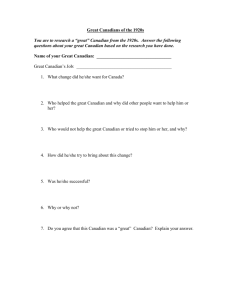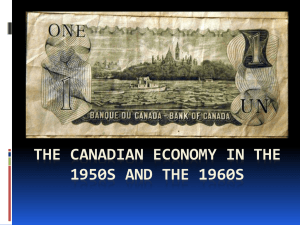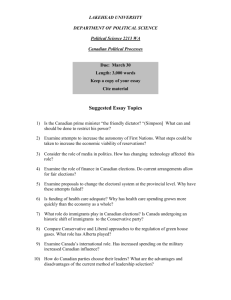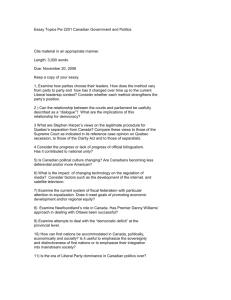Can. History Essay Topics
advertisement
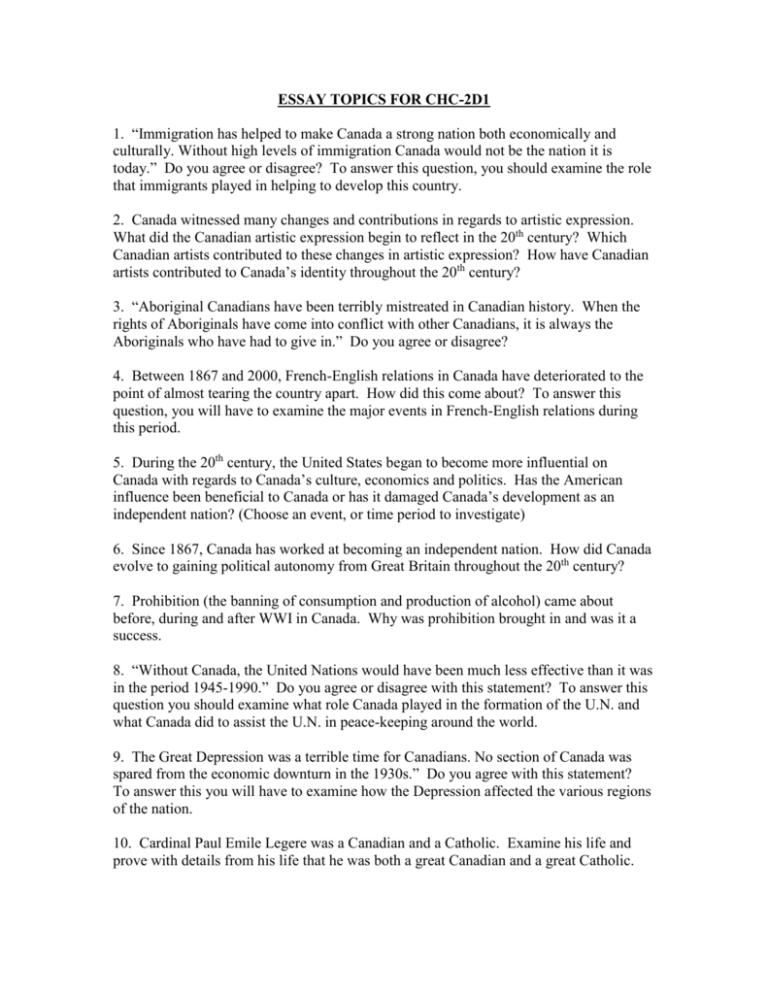
ESSAY TOPICS FOR CHC-2D1 1. “Immigration has helped to make Canada a strong nation both economically and culturally. Without high levels of immigration Canada would not be the nation it is today.” Do you agree or disagree? To answer this question, you should examine the role that immigrants played in helping to develop this country. 2. Canada witnessed many changes and contributions in regards to artistic expression. What did the Canadian artistic expression begin to reflect in the 20th century? Which Canadian artists contributed to these changes in artistic expression? How have Canadian artists contributed to Canada’s identity throughout the 20th century? 3. “Aboriginal Canadians have been terribly mistreated in Canadian history. When the rights of Aboriginals have come into conflict with other Canadians, it is always the Aboriginals who have had to give in.” Do you agree or disagree? 4. Between 1867 and 2000, French-English relations in Canada have deteriorated to the point of almost tearing the country apart. How did this come about? To answer this question, you will have to examine the major events in French-English relations during this period. 5. During the 20th century, the United States began to become more influential on Canada with regards to Canada’s culture, economics and politics. Has the American influence been beneficial to Canada or has it damaged Canada’s development as an independent nation? (Choose an event, or time period to investigate) 6. Since 1867, Canada has worked at becoming an independent nation. How did Canada evolve to gaining political autonomy from Great Britain throughout the 20th century? 7. Prohibition (the banning of consumption and production of alcohol) came about before, during and after WWI in Canada. Why was prohibition brought in and was it a success. 8. “Without Canada, the United Nations would have been much less effective than it was in the period 1945-1990.” Do you agree or disagree with this statement? To answer this question you should examine what role Canada played in the formation of the U.N. and what Canada did to assist the U.N. in peace-keeping around the world. 9. The Great Depression was a terrible time for Canadians. No section of Canada was spared from the economic downturn in the 1930s.” Do you agree with this statement? To answer this you will have to examine how the Depression affected the various regions of the nation. 10. Cardinal Paul Emile Legere was a Canadian and a Catholic. Examine his life and prove with details from his life that he was both a great Canadian and a great Catholic. Page 2 11. In 1959, the Diefenbaker government cancelled the Avro Arrow project. Was this a mistake on the part of the government? To answer this, examine why they made this decision, what happened to the government after they made this decision, and what happened to the Canadian airplane industry when the contract was cancelled. 12. In 1988, the government of Canada signed a Free Trade deal with the United States. Many people opposed it because they thought that it would destroy Canada’s industry, culture and independence. Assess whether the Free Trade deal has hurt or helped Canada in the years since it was passed. 13. In 1949, Newfoundland became part of Canada. Why did the people choose to join Canada? Was it because they truly wanted to be Canadians or did they believe that they really did not have any other choice? 14. “Without Canada, the allies would probably have lost the Second World War.” Do you agree or disagree with this statement? To answer this question, you will have to examine Canada’s contribution to the war effort. 15. World War One changed Canada and also how the world viewed Canada. Some people say that Canada did not really become a nation until it participated in World War One. Examine how Canada was changed as a result of World War One. 16. In the 1930s Grey Owl fooled the world by pretending to be a native yet he also spread the message of the need to protect the environment. Examine the career of Grey Owl. Was he a complete fraud out to fool the world or was he a committed environmentalist? To answer this question, you should examine why he assumed the identity of an Aboriginal and what he did with his fame. 17. Today men and women are equal in Canadian society. Yet, during the early 1900s most women could not even work outside the home. Why has this changed so drastically by the end of the 20th century. To answer this, you will have to look at the major events in this time period that helped women to gain equality. Did society decide that it was only fair that women be given equality or did women have to struggle to gain this equal status? (Consider focusing on a particular event(s), or a decade) 18. The 1920s and 1930s witnessed a growth in new political parties in Canada (eg. Communist Party, C.C.F., Social Credit Party and the Union Nationale). Why did these parties form in this time period? Had conditions changed so much that there was a need for new political parties at this time? Examine these political parties and outline their main policies. Explain how they were trying to address the problems of this time period. Page 3 19. Canada has been involved with some of the great scientific and technological changes seen through-out the world during the 20th century. Were some of these scientific and technological innovations discovered or created by Canadian scientists and inventors? To answer this question you should examine some of the major innovations or discoveries that were orchestrated by Canadian scientists or inventors. (Try to pick a decade or time period such as the 1960s which is a good decade to research) 20. Why did athlete Ned Hanlan become Canada’s first world champion? Examine the events that led to him become the world champion in rowing. 21. “Without Sir John A. Macdonald’s ‘National Policy’ Canada would not be the strong nation it is today.” Do you agree or disagree with this statement? To answer this question you should examine what the ‘National Policy’ was and what it did for Canada. 22. “Pierre E. Trudeau is regarded to be one of Canada’s best prime ministers ever.” Do you agree or disagree with this statement? Support your response by examining Trudeau’s years as prime minister. 23. “During the 20th century, Canada made its mark in the world of sports.” Choose a specific sport which Canada has become a leader in. Examine: why the sport started in Canada; why it became very popular; which athletes contributed to the sport; and the sport’s contribution to the citizens of Canada. 24. In 1963, the Royal Commission on Bilingualism and Biculturalism made a report on how Canada should deal with the issue of French-English relations in Canada. Examine the main recommendations of this report. How have governments since this report was issued tried to implement these recommendations? Have these recommendations been successful in dealing with this issue? 25. “The social welfare system in Canada developed as much out of political necessity as it did for genuine concern for the population.” Examine examples which prove or go against this statement. 26. “Canada, since World War II, has made a great contribution to the development of the Arts.” Prove that this is true by examining the contribution made by 4 different artists in the period since 1945. Make sure you explain why their contributions are important to the artistic world (You could use musical artists or literary artists). 27. What contribution did the Canadian Navy make to the allied war effort in WWII? Was the role of the Canadian Navy vital to the assuring victory for the allies over the axis powers or was its role just a minor one? Page 4 28. “Canada should have and could have done more to help the victims of the Holocaust before, during and after WWII.” Do you agree or disagree with this statement? To answer this question you will have to briefly examine what Canada did do and then argue that they could have or could not have done more. 29. “Since WWII, the 1950s and/or 1960s witnessed some positive changes for the Aboriginals in Canada.” Do you agree or disagree with this statement? Examine how the lives of Aboriginals were or were not improved through political, economic and social reforms/changes. 30. “The 1990s was an important decade for Aboriginal nations (in Canada)” Research treaty signings and other government related dealings with Canada’s Aboriginals. 31. The 1960s have often been referred to as an era of protest. What were the key factors behind the civil rights movement in Canada between 1945 and 1970? 32. Since 1957 Canada has participated in the most number of peacekeeping operations throughout the world. Should Canada continue to be a leader in promoting peace? Why has Canada maintained such a strong peacekeeping institution for the past 50 years? 33. The 1950s was an era of rock’n’ roll. What made rock’n’roll so popular with Canadian teenagers of the 1950s? 34. In past 100 years, Canada has produced some of the most famous female athletes in sport history. Why were the 1920s an important decade for Canadian women in sports? 35. What were the main reasons why Rene Levesque lost the 1980 Quebec Referendum? 36. Why did the Separatist forces lose the 1995 Quebec Referendum? Who were the main opponents to Quebec separating from Canada? 37. “Canada is known for its share in environmental activism”. Examine a particular Canadian group such as Greenpeace and describe the organizations 3 or 4 greatest efforts in promoting environmental activism. 38. On February 15, 1965, the Canadian government unveiled Canada’s new national flag with the single red maple leaf. Why was this such a controversial issue in Canada? What were the key reasons as to why many believed it was time to have a new national flag and thus say good bye to the Red Ensign? 39. “Canada made significant contributions in the Korean War”. Explain how Canada did its best to defend South Korea from be taken over by the northern Communist forces. ;





